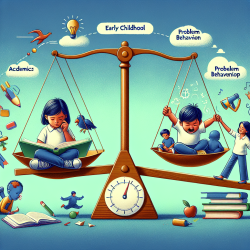Understanding the Link Between Behavior and Academics in Young Learners
As a practitioner dedicated to fostering positive outcomes for children, understanding the interplay between behavior and academic performance is crucial. The research article "Transactions between Problem Behaviors and Academic Performance in Early Childhood" provides valuable insights into how these elements interact and influence each other from kindergarten to third grade.
Key Findings from the Study
The study analyzed data from the Early Childhood Longitudinal Study, Kindergarten Class of 2011, involving 18,135 students. It employed cross-lagged panel modeling to explore the reciprocal relationships between problem behaviors (internalizing and externalizing) and academic performance (reading and math).
Key findings include:
- Higher externalizing and internalizing problem behaviors predicted lower academic performance.
- Conversely, lower academic performance predicted higher externalizing and internalizing problem behaviors.
- These relationships were consistent over time, highlighting a transactional process.
Implications for Practitioners
Understanding these transactional relationships can guide practitioners in developing more effective intervention strategies. Here are some ways to implement these findings:
- Early Identification: Monitor both academic and behavioral indicators from an early age to identify students at risk of maladaptive outcomes.
- Holistic Interventions: Design interventions that address both academic and behavioral challenges concurrently, rather than in isolation.
- Continuous Monitoring: Regular assessments can help track the progress of interventions and make necessary adjustments.
Encouraging Further Research
While this study provides significant insights, it also opens avenues for further research. Future studies could explore:
- The role of socio-economic factors in moderating these relationships.
- Gender-specific pathways between behavior and academic performance.
- The impact of different types of internalizing symptoms, such as anxiety and depression, on academic outcomes.
Conclusion
The study underscores the importance of addressing both behavioral and academic issues in early childhood to prevent long-term maladjustment. By integrating these findings into practice, educators and therapists can better support children in achieving their full potential.
To read the original research paper, please follow this link: Transactions between Problem Behaviors and Academic Performance in Early Childhood.










